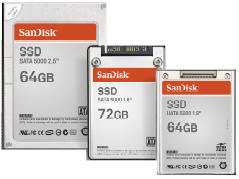What is a Solid State Hard Drive, SSD, Flash?
 Solid state hard drive (SDD) is the newest type of hard drive on the market at this time. Currently only being produced for laptop systems, these hard drives are based on flash memory and have no moving parts like the standard hard drives we know today. While they are much faster, cooler, and more energy efficient, the price is much to be desired per gigabyte. The intentions of this page is not to detail out what all a SSD drive is made of and how it works, but rather to show the pro’s and con’s. Maybe latter on (a couple of years) we will re-
Solid state hard drive (SDD) is the newest type of hard drive on the market at this time. Currently only being produced for laptop systems, these hard drives are based on flash memory and have no moving parts like the standard hard drives we know today. While they are much faster, cooler, and more energy efficient, the price is much to be desired per gigabyte. The intentions of this page is not to detail out what all a SSD drive is made of and how it works, but rather to show the pro’s and con’s. Maybe latter on (a couple of years) we will re-
Solid State Hard Drive Pro’s:
- Very fast start-
ups and data transfer, no spinning components - Fast read/write times
- Heat generation is minimized compared to a mechanical drive
- Mechanical failure is reduced to electronic failure only, not both
- Don’t weigh as much as counter part laptop drives
Solid State Hard Drive Con’s:
- Cost more per gigabyte, then traditional mechanical drives
- Storage space is behind the mechanical drives
- Further acceptable to magnetic fields and static electricity
- Could “wear out” sooner than a conventional drive, if read/writes (data) is written in the same area over and over instead of the entire drive. This issue is known and is addressed with software and firmware to prevent such things from happening.
As you can see these drives have potential along with their disadvantages too. The consumer (you) will ultimately decide the fate of this new technology in the years to come as they are tested for durability and longevity. If you are interested in purchasing a Solid State Hard Drive, may we suggest you check out Tiger Direct first for pricing before you shop around elsewhere. Remember SSD’s are much more in cost than the conventional drives at this time.
The future of hard drives is ever changing. One trend we are seeing at is that Solid State Drives (SSDs) are slowly replacing electromagnetically, spinning-
SSDs have no moving parts inside and data is stored using non-
Although SSDs offer benefits over current hard drives, data is still at risk from problems such as directory corruption, virus attack, accidental file deletion, impact, electrical spike and fire or water damage. Drive Savers Data Recovery engineers are skilled in recovering data from SSDs and stand ready to recover from these problems and worse





Nice Content about What is a Solid State Hard Drive, SSD, Flash?